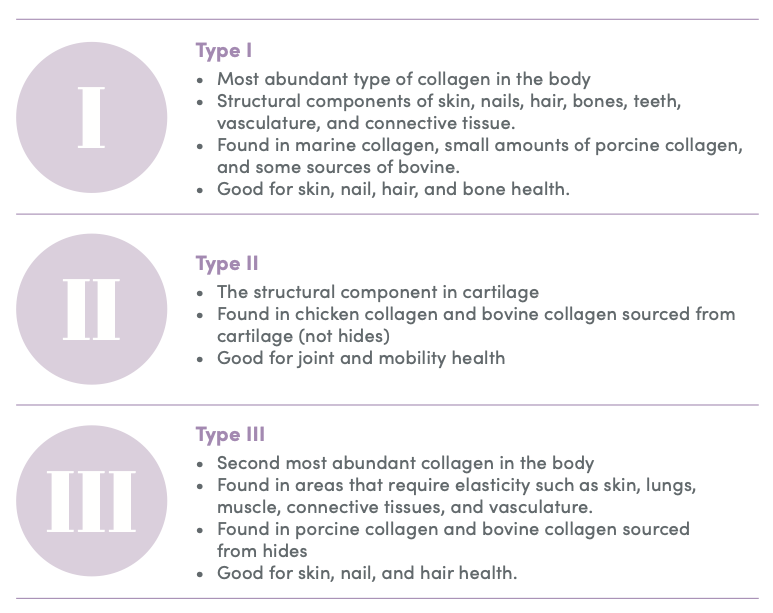Everything You Need To Know About Collagen Supplements
Collagen is the most abundant protein in our body, it is responsible for giving our skin, joints, tendons, ligaments and hair structure and resilience. Think of it as the scaffolding or the poles holding up a tent – without it, we have a weak structure that stretches, sags, wrinkles and cannot retain moisture effectively. Unfortunately, as we age, our collagen levels progressively decline and this contributes to the signs of ageing.
There are five common types of collagen classified under type I-V. While 90% of our body contains type I collagen, our skin has an abundance of type I and III. Our body makes collagen through cells called fibroblasts. They also produce other skin-serving elements like elastin and hyaluronic acid. Stimulating fibroblasts to ‘switch on’ increases collagen production. This is one of the goals to control the speed of skin ageing!
How Our Body Absorbs Collagen Supplements
Just like if you ate brains (offal, anyone?), it wouldn’t make you smarter; when you swallow collagen, it isn’t absorbed intact to go on to boost your collagen levels. If only it were that simple.
So how does your body absorb and use ingested collagen? Collagen is too big to be absorbed whole – therefore, collagen first needs to get broken down into smaller collagen peptides called collagen hydrolysates (CH). This is the form that supplement products will often use in their formula. Once ingested, the body breaks it down further into bioactive collagen bipeptides and tripeptides. These can be absorbed into the bloodstream and distributed throughout the body, in particular – to the skin’s dermis.
There are three suggested pathways ingested collagen hydrolysates (CH) promote skin health:
- Stimulates fibroblasts and downregulates Matrix metalloproteinases (MMPs) – resulting in improved collagen
- Inactivates free radicals – reducing cellular damage and inflammation
- Inhibits inflammation by regulating inflammation signallers called cytokines
Skin Benefits of Collagen Supplementation
A systematic study looked at multiple Randomised Controlled Trials (RCTs) using CH, collagen dipeptides, and/or collagen tripeptides and suggested their skin benefits are:
- Improved skin elasticity
- Improved collagen density
- Reduction in collagen breakdown
- Improved skin moisture
- Increased production in procollagen type I and elastin
- Reduction in cellulite (BMI <25)
- Improved wound healing
Are collagen supplements safe? No observations of Adverse Events were recorded across all studies. This suggests collagen supplements are well tolerated with few issues or side effects.
What’s the Best Source of Collagen?
Though there are thousands of collagen supplements on the market – they’re not all the same.
Collagen can derive from various sources, including cows (bovine collagen), pigs (porcine collagen), and fish (marine collagen). Interestingly, since marine collagen has a comparatively lower molecular weight, it is absorbed approximately 1.5x more efficiently than bovine or porcine sources. Marine collagen is most similar to human collagen structurally, making it the ideal source for nutraceutical use. Each source comprises a different makeup of collagen (between type I, II, and III), each one holding its own benefit.
When choosing a collagen supplement, look for brands that share specific details on their source of collagen. For example, if the source is bovine collagen, where is it sourced, and under what conditions? Grass-fed, hormone-free, sustainable, and kind living conditions? In addition, your diet, religion, and allergy history may also factor into your decision of what source of collagen is best for you. Marine sources are great for people who don’t eat beef or pork, pescatarians, or people who minimise their meat consumption. However, if you have a fish allergy, we don’t recommend marine collagen.
Collagen Types 1 – 3

Pro Tip: We are keen to let you know what collagen we source for our supplements to be totally transparent.
Pro You uses Marine Verisol® F Bioactive Collagen Peptides. Verisol® F has scientifically proven research showing their collagen peptides:
- Increase collagen content in the skin
- Increase skin elasticity
- Reduce periorbital (around the eye) wrinkles
- Increase hair thickness
- Increase nail health (less peeling, cracking) and growth
- Decrease cellulite
These results have been demonstrated in several clinical trials during the last ten years with nearly 500 study participants.
The research on Verisol® F is respectable as it uses data collected from peer reviewed RCTs. Their studies also cover multiple ethnicities; this is important to understand the applicability to our entire population and not just a segment of it
Can Collagen be Plant-Based?
Riding the collagen wave are many vegan and plant-based brands. But what’s the deal with these? Can plants actually provide skin-serving benefits like their animal- based counterparts?
Unlike animal products, plants don’t contain collagen; therefore, they aren’t a source of collagen. This is because collagen is found in hair, skin, nails, and connective tissue – all of which aren’t present in plants. What these plant-friendly supplements bring to the table are ingredients that may help stimulate collagen production. Often termed Collagen Boosters or Collagen Builders, these plant-based supplements supposedly help nourish the body to encourage collagen production without containing collagen itself. All in all, it’s best to be wary of any claims of vegan or vegetarian collagen sources. In saying this, vegan and vegetarian collagen is being developed through genetically modified bacteria and yeast. As science and research improves in these areas, it will be worth keeping an eye on!
How Much Collagen Do You Need?
No explicit or defined optimal dose for collagen supplementation currently exists. Research studies on collagen supplements have ranged between 2.5 to 10 grams. These studies looked at various benefits, including skin ageing and wound healing. A systematic review also noted not all collagen supplements are created equal. Collagen supplements can vary vastly – depending on what collagen hydrolysate or peptide is used. Therefore, comparing doses only reveals part of the puzzle. To get the complete picture and make fairer comparisons, the type of collagen hydrolysate or peptide should also be considered.
We recommend looking for a substantiated source of collagen at a minimum of 5 grams per day.
How to compare collagen supplements:
- Check the dosage
- Check the type of collagen
(e.g. is it a hydrolysate or a peptide) - Check for other ingredients that can work synergistically with collagen
This is just a taste of what our 28 page Skin Supplementing Guide has to offer –
Download Ingestible Beauty
– Your Complete Skin Supplementing Guide

References:
Edgar, S., Hopley, B., Genovese, L. et al. Effects of collagen-derived bioactive peptides and natural antioxidant compounds on proliferation and matrix protein synthesis by cultured normal human dermal fibroblasts. Sci Rep 8, 10474 (2018). https://doi.org/10.1038/s41598-018-28492-w
León-López, A., Morales-Peñaloza, A., Martínez-Juárez, V. M., Vargas-Torres, A., Zeugolis, D. I., & Aguirre-Álvarez, G. (2019). Hydrolyzed Collagen-Sources and Applications. Molecules (Basel, Switzerland), 24(22), 4031. https://doi.org/10.3390/molecules24224031
Choi, F. D., Sung, C. T., Juhasz, M. L., & Mesinkovsk, N. A. (2019). Oral Collagen Supplementation: A Systematic Review of Dermatological Applications. Journal of drugs in dermatology : JDD, 18(1), 9–16.







